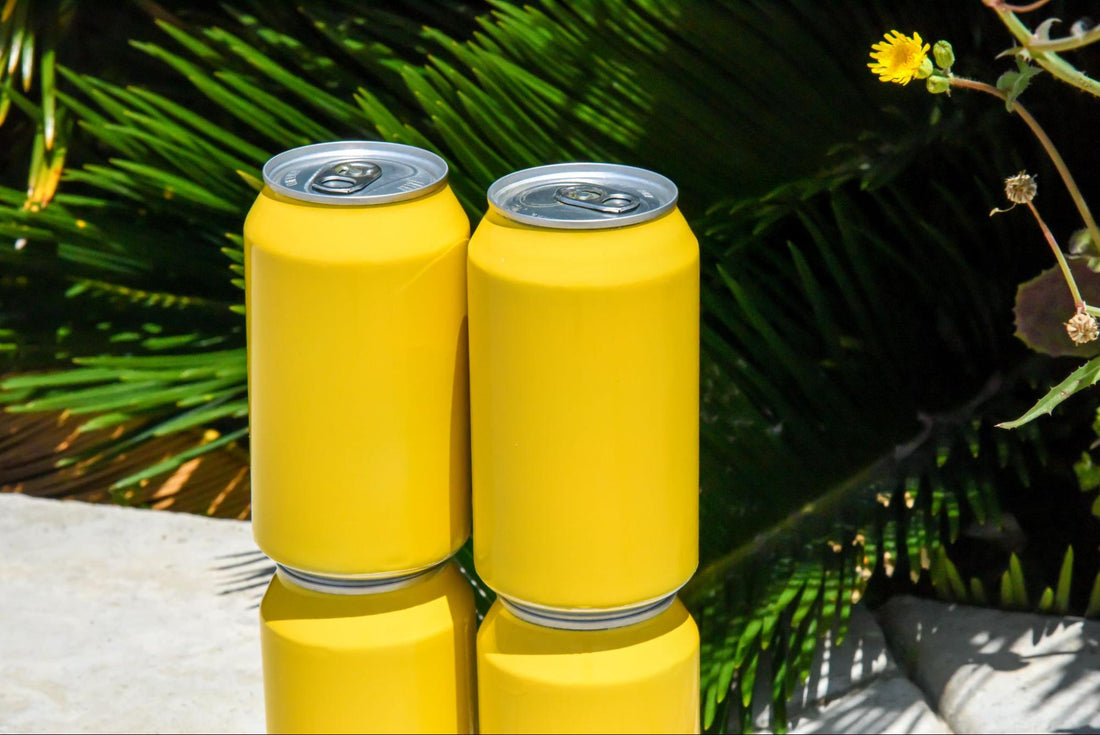Yes, energy drinks can make you gain weight. They often contain high sugar levels and calories.
Energy drinks are popular for a quick energy boost. Many people rely on them during long workdays or intense workouts. But have you ever thought about the impact they have on your weight? These drinks might give you a temporary lift, but they can also add extra pounds.
Their high sugar and calorie content can lead to weight gain. Understanding the connection between energy drinks and weight gain can help you make healthier choices. Let’s explore this topic further to see how these drinks can affect your waistline.

Credit: www.healthylincoln.org
Introduction To Energy Drinks
Energy drinks have become incredibly popular in recent years. People consume them for a quick boost of energy. But can these drinks make you gain weight? Let’s explore.
Popular Brands
Several brands dominate the energy drink market. Here are a few well-known ones:
- Red Bull: Known for its slogan “Gives You Wings”.
- Monster: Popular among younger crowds.
- Rockstar: Targets active and adventurous people.
- 5-hour Energy: Offers quick and small energy shots.
Common Ingredients
Energy drinks typically contain a mix of ingredients. Here are some of the most common:
| Ingredient | Purpose |
|---|---|
| Caffeine | Boosts alertness and energy levels |
| Sugar | Provides quick energy but can lead to weight gain |
| Taurine | Supports neurological development |
| Vitamins B | Helps convert food into energy |
Understanding these ingredients is crucial. They can affect your body in different ways. For example, sugar is a key factor in weight gain.
Nutritional Content
Energy drinks have become a popular choice for boosting energy. But can they make you gain weight? Let’s explore the nutritional content of these drinks to find out.
Sugar Levels
Many energy drinks contain high amounts of sugar. This can lead to weight gain. For example, a 16-ounce energy drink can have up to 54 grams of sugar. That’s about 13.5 teaspoons of sugar!
Too much sugar can cause your body to store fat. This leads to weight gain. High sugar intake is also linked to other health issues.
Caloric Intake
The calories in energy drinks add up quickly. A typical 16-ounce energy drink may contain around 200 calories. If you drink one every day, that’s an extra 1,400 calories a week.
Here is a quick comparison of popular energy drinks:
| Energy Drink | Calories (16 oz) | Sugar (grams) |
|---|---|---|
| Red Bull | 210 | 54 |
| Monster | 220 | 58 |
| Rockstar | 250 | 63 |
Consuming these drinks regularly can lead to excess calorie intake. This may result in weight gain.
It’s important to check the nutritional content of energy drinks. Knowing the sugar levels and caloric intake can help you make better choices.
Impact On Metabolism
Energy drinks are popular for their quick boost of energy. But can they affect your metabolism and weight? This section explores how energy drinks impact your body.
Short-term Effects
Energy drinks contain caffeine and sugar. These ingredients can speed up your metabolism for a short time. This temporary boost helps burn calories quickly.
But, the high sugar content can be harmful. A single can of energy drink may have up to 54 grams of sugar. Consuming too much sugar leads to a rapid increase in blood sugar levels. This spike is often followed by a crash, making you feel tired and hungry again.
Long-term Consequences
Frequent consumption of energy drinks can lead to weight gain. The added sugars in these drinks are stored as fat if not burned off. Over time, this can increase your body fat percentage.
Moreover, regular intake of caffeine can affect your sleep patterns. Poor sleep can slow down your metabolism. This means you burn fewer calories even at rest.
Energy drinks can also cause insulin resistance. This is when your body stops responding to insulin properly. It can lead to type 2 diabetes and further weight gain.
Here’s a simple table to show the contents of a typical energy drink:
| Ingredient | Amount per Can |
|---|---|
| Caffeine | 80 mg |
| Sugar | 54 grams |
| Calories | 200 kcal |
In conclusion, while energy drinks offer a quick energy boost, they can impact your metabolism and contribute to weight gain if consumed regularly.
Energy Drinks And Exercise
Energy drinks have become popular among fitness enthusiasts. They promise to boost performance and aid recovery. But, can they also make you gain weight? Let’s explore their impact on exercise.
Performance Boost
Energy drinks often contain caffeine and taurine. These ingredients can enhance alertness and endurance. Many athletes consume them before workouts. They believe it gives them a performance edge.
Studies show caffeine can improve focus and reaction time. This can be beneficial during high-intensity exercises. Taurine, an amino acid, helps with muscle function. It might reduce muscle fatigue, enabling longer exercise sessions.
Yet, energy drinks are also high in sugar. Consuming too much sugar can lead to weight gain. Be mindful of the calorie content. Choose sugar-free options if weight management is a concern.
Post-workout Recovery
After a workout, the body needs nutrients to recover. Some energy drinks contain electrolytes. They help replenish minerals lost through sweat. This can aid in faster recovery.
Protein is another key component for recovery. Some energy drinks include protein or amino acids. These can help repair and build muscle tissue.
Despite these benefits, be cautious. The high sugar content in many energy drinks can offset the benefits. Too much sugar intake can hinder weight loss goals. Opt for drinks with low or no added sugars.
In summary, energy drinks can aid exercise performance and recovery. But, their high sugar content can contribute to weight gain. Always check labels and choose wisely.
Hidden Calories
Many people drink energy drinks to boost their energy levels. But, these drinks can have hidden calories that might surprise you. It’s easy to overlook these calories, but they can add up quickly.
Additives And Sweeteners
Energy drinks often contain additives and sweeteners. These ingredients can increase the calorie content. Many sweeteners are sugar-based, which means they add extra calories. Even artificial sweeteners can trick your body into craving more food. This can lead to overeating.
Serving Size Misconceptions
Many energy drinks come in large cans. The label might show calories for one serving. But one can could be two or more servings. This means you might drink more calories than you think. Always check the serving size on the label. It can help you understand how many calories you are really consuming.
Comparing Beverages
Energy drinks are popular for a quick boost. But, do they cause weight gain? Let’s compare them with other beverages. We will look at soft drinks and coffee. This will help you understand better.
Energy Drinks Vs. Soft Drinks
Soft drinks have high sugar content. This can lead to weight gain. Energy drinks also contain sugar. But they have other ingredients too. These include caffeine and taurine. These can affect your body differently.
Calories in energy drinks may be higher. Soft drinks usually have empty calories. Energy drinks may also have added vitamins. But the sugar can still add to weight gain. Both can contribute if consumed in large amounts.
Energy Drinks Vs. Coffee
Coffee is a natural source of caffeine. It has no sugar unless you add it. Black coffee has almost no calories. Energy drinks, on the other hand, often contain sugar. They also have artificial flavors and colors.
Energy drinks may give a quicker energy boost. But coffee can be a healthier choice. It is less likely to cause weight gain. Choose wisely to manage your calorie intake.
Weight Gain Factors
Can energy drinks lead to weight gain? Let’s explore the key weight gain factors related to energy drink consumption. Understanding these factors can help manage your weight effectively.
Dietary Habits
Energy drinks often contain high amounts of sugar and calories. Consuming them regularly can add extra calories to your diet. This can lead to weight gain over time.
Consider the following table that shows the calorie content of some popular energy drinks:
| Energy Drink | Calories per 8 oz |
|---|---|
| Red Bull | 110 |
| Monster | 101 |
| Rockstar | 122 |
These extra calories can add up quickly. For example, drinking one can of Monster daily adds 707 calories per week. That’s a significant amount!
Lifestyle Choices
People who consume energy drinks may also have other lifestyle habits that contribute to weight gain. Such habits include:
- Skipping meals: Relying on energy drinks instead of balanced meals.
- Low physical activity: Not exercising enough to burn off the extra calories.
- Poor sleep patterns: Lack of sleep can affect metabolism and increase cravings for high-calorie foods.
These lifestyle choices can make it harder to maintain a healthy weight. Regular exercise and balanced meals are crucial for weight management.
Understanding these weight gain factors can help you make better choices. Reduce your energy drink consumption and adopt healthier habits.

Credit: honehealth.com
Healthier Alternatives
Many people seek energy drinks for a quick boost. However, these drinks can lead to weight gain. They often contain high sugar levels and empty calories. Fortunately, there are healthier alternatives that can give you the energy you need without the extra weight. Below, we explore natural energy boosters and low-calorie options.
Natural Energy Boosters
Instead of reaching for an energy drink, consider natural energy boosters. These options are healthier and provide sustained energy.
- Water: Staying hydrated is crucial for energy levels. Drink plenty of water throughout the day.
- Fruits: Fruits like bananas and apples offer natural sugars and vitamins.
- Green Tea: Green tea contains caffeine and antioxidants. It can improve alertness without the crash.
- Nuts: Nuts are rich in protein and healthy fats, providing long-lasting energy.
- Oatmeal: A bowl of oatmeal can keep you full and energized for hours.
Low-calorie Options
If you prefer drinks, there are low-calorie options that can provide energy without the extra calories.
| Drink | Calories | Benefits |
|---|---|---|
| Black Coffee | 2 | Boosts alertness and metabolism |
| Herbal Tea | 0 | Contains calming properties and antioxidants |
| Electrolyte Drinks | 5-10 | Replenishes lost minerals and hydration |
| Vegetable Juices | 50 | Rich in vitamins and low in sugar |
Choosing these healthier alternatives can help maintain energy levels and control weight.
Expert Opinions
Curious about whether energy drinks can make you gain weight? Let’s dive into expert opinions. Nutritionists and fitness trainers have shared their insights. Their advice will help you understand the impact of energy drinks on your weight.
Nutritionist Insights
Nutritionists have studied the ingredients in energy drinks. Most of these drinks contain high amounts of sugar and caffeine. Sugar provides quick energy but adds empty calories. This can lead to weight gain.
According to nutritionists, a standard energy drink can contain up to 50 grams of sugar. That’s more than 10 teaspoons! Consuming such high sugar levels regularly may contribute to obesity.
Nutritionists also point out the presence of other additives. These include artificial flavors and colors. These do not add nutritional value and may cause long-term health issues.
Fitness Trainer Advice
Fitness trainers focus on the body’s response to energy drinks. They observe that while these drinks can boost energy, this is often short-lived.
Many fitness trainers notice their clients consuming energy drinks before workouts. This might seem like a good idea, but it has drawbacks. The high sugar content can lead to a crash in energy levels later. This can reduce workout effectiveness.
Fitness trainers also advise that the caffeine in energy drinks can affect sleep. Poor sleep can reduce the body’s ability to recover from exercise. This can hinder muscle growth and fat loss.
Instead of energy drinks, fitness trainers recommend natural alternatives. These include water, green tea, and fruit smoothies. These options provide sustained energy without the negative effects of sugar and artificial additives.
Summary Table: Expert Opinions
| Aspect | Nutritionist Insights | Fitness Trainer Advice |
|---|---|---|
| Sugar Content | High, leading to empty calories and potential weight gain | Causes energy crashes, reducing workout effectiveness |
| Caffeine | Provides a temporary boost but can affect sleep | Can lead to poor sleep and hinder recovery |
| Artificial Additives | No nutritional value, possible long-term health issues | Not addressed directly, but natural alternatives preferred |

Credit: ethans.com
Frequently Asked Questions
Do Energy Drinks Cause Weight Gain?
Energy drinks can cause weight gain due to high sugar and calorie content. Consuming them frequently may lead to excess calorie intake, contributing to weight gain.
How Many Calories Are In Energy Drinks?
Most energy drinks contain between 100 to 250 calories per serving. This varies by brand and size of the drink.
Are There Sugar-free Energy Drinks?
Yes, many brands offer sugar-free energy drinks. These options typically contain artificial sweeteners and fewer calories, reducing the risk of weight gain.
Can Energy Drinks Increase Appetite?
Energy drinks may increase appetite due to their high sugar content. This can lead to overeating and potential weight gain.
Conclusion
Energy drinks can contribute to weight gain. They often contain high sugar levels. Extra calories from sugar turn into fat. Limiting energy drink intake helps maintain a healthy weight. Check labels for hidden sugars and calories. Choose healthier alternatives for better energy levels.
Making informed choices keeps you healthy and fit. Always prioritize your well-being and stay mindful of your diet.
